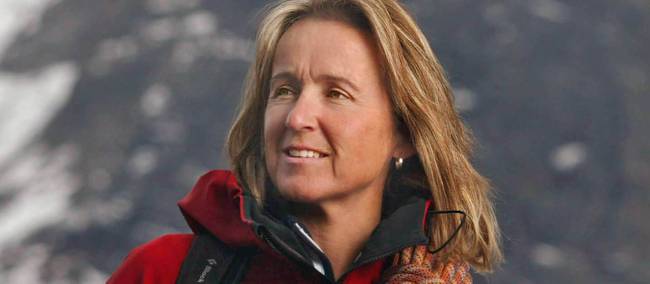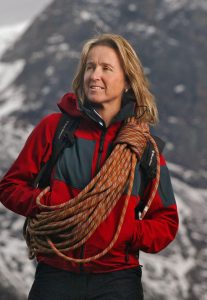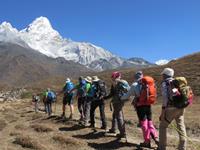
Sharon Wood | Sharon Wood
Blog home / On the Couch: An Interview with Sharon Wood
Her website reads, “Sharon’s story is not about extraordinary people – her story is about the extraordinary that exists in every individual and team.” Sharon Wood is the first North American woman to climb Mount Everest and the first woman in the world to climb it by a new route without Sherpa assistance.
Two decades later, mother of two teenage sons, founder of a private school, president of her own company, professional climbing guide and public speaker; Sharon still leads a life rich with risk, challenge and change.
We’re delighted that Sharon will be leading our special Women’s Everest Base Camp departure this spring. Fascinated by her insights into the remote mountain experience, we took the opportunity to ask a few questions.
Your father took you on your first technical climb when you were only twelve - was the whole family interested in mountain activities?
Not really. My dad was the keener. I was the youngest of three siblings, and I was always eager to accompany my dad on his hiking and ski excursions. He did not like technical climbing and was quite worried when I started in earnest at the age of sixteen.
In 1977, you joined an all women’s expedition to Mont Logan that was instrumental in your mountaineering career. Do you think the “gender gap” in climbing, if it even exists, is coming to a close?
Mount Logan was a very lucky break for me. I am grateful to the five other women who invited me on that trip when I was just nineteen-years old. We were all new to altitude and the low technical challenge of our route was the right gradient for our experience level. With that said, and having led several women’s mountain excursions and skills courses, I think the dynamic empowers some women to step forward, be more assertive, and feel more comfortable.

When you reached Mount Everest’s summit on May 20, 1986 with Dwayne Congdon, you became the first North American woman to climb Everest. What did it change for you on a personal and professional level?
Our success on Everest catapulted me into an accidental career as a professional speaker. I have spoken to over a thousand audiences by now ranging in size from six to six thousand. They say public speaking is our number one daily fear, death is sixth on the list. I agree, but the speaking has provided an amazing window to places and lives I would have never known. In terms of personal changes, I’d say the thirty plus years of reflection has made me a better and more appreciative friend. I’m grateful for the abiding friendships with my twelve teammates on our Everest Light team. Everest also had a very dramatic effect on my perspective. There were a lot of times during our expedition where I wanted to give up because I was too tired, or too scared but I recognized then that I was my own greatest obstacle. Now, when I’m faced with a challenge and am deciding whether to step up or step back, I’ll ask myself, “What is the worst thing that can happen to my by trying this?” and, “Will I regret not trying this in twenty years time, and be plagued with wondering whether I could have done it for the rest of my life?” To fail without trying is unacceptable.
What are the biggest lessons you learned on the mountains?
Don’t get me started! Simply put, the mountains taught me to trust and like myself, which was no easy feat. The mountains test, expose, teach, astound and humble us. In my books, and I may be a little biased, there is no better arena to explore our relationship to self, others and the ground beneath our feet. It is an environment where you may not always get what you want, but you’ll get lessons in spades. More than anything, I’ve learned that challenges, which capture our imagination and are beyond our reach, give us cause to rise to our potential. And, I believe each time we rise we become a little less confined by our limitations and more defined by the possibilities.
Do you have any preparation tips for someone interested in a high altitude expedition?
I have many tips, too many to list, but I’ll give a couple for now. Pee bottles, for one – we’ll talk. Most of my tips are based around comfort. I believe the more comfortable you are the better you will acclimatize. A layered clothing system, which allows you to peel off layers or put on layers without having to redress is important. This applies to psychological comfort as well. It’s not a race, it doesn’t matter how fast you can run or walk at sea level, what matters is pacing yourself to the new normal at altitude which is VERY slow and steady. We climbers call altitude the great equalizer. It is not the fittest who will best acclimatize, it is she who adapts who will best acclimatize.
You are now a public speaker in North America - why is it important for you to inspire the next generation to get out there?
I speak to a broad demographic ranging from school children to seniors, corporate to not-for-profit. Actually, it is important for me to inspire all ages. My passion is in helping people close the gap between what they think they can do and what they can actually accomplish. It’s not about talent, or strength, it’s about finding the courage to begin - to try, and the resources you need to support you, which is often the hardest stage of taking on a challenge.
What advice do you have for people hesitant to break out of their comfort zone?
I believe self-compassion is essential in terms of recognizing one’s personal comfort zone. I encourage individuals to start where they are at, get out of the comparison trap and acknowledge their own courageous steps. As well, I believe a doable gradient is essential rather than something unrealistic. I do NOT believe in pulling dreams off the shelf. The challenge has to be something you respond to, that captures your imagination and interest. I like to gently prod, and support, give examples of my own propensity to doubt and fear and testify to the value of breaking free of our own self-imposed limitations and through to a more liberated life.

Trek in Nepal with Sharon Wood in 2018
Offering women the chance to engage in an active travel experience in a safe, supportive, and encouraging environment, the Women’s Everest Base Camp Adventure with Sharon Wood will add inspirational stories and deepen traveller’s knowledge of trekking in the Himalaya’s to this already amazing experience. The carefully devised itinerary allows plenty of time for safe acclimatization in addition to experienced guides, crew, and porters.
Find Out More